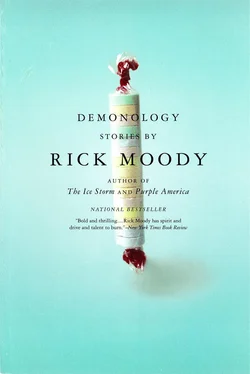— We wanted to dialogue with you (Brice was explaining to Glenda), because we wanted to make sure that you were thinking creatively along the same lines we are. We want to make sure you’re comfortable with our plans. As married people, as committed people, we want this ceremony to make others feel good about themselves, as we’re feeling good about ourselves. We want to have an ecstatic celebration here, a healing celebration that will bind up the hurt any marriages in the room might be suffering. I know you know how the ecstasy of marriage occasions a grieving process for many persons, Mrs. Manzini. Sarah and I both feel this in our hearts, that celebrations often have grief as a part of their wonder, and we want to enact all these things, all these feelings, to bring them out where we can look at them, and then we want to purge them triumphantly. We want people to come out of this wedding feeling good about themselves, as well be feeling good about ourselves. We want to give our families a big collective hug, because we’re all human and we all have feelings and we all have to grieve and yearn and we need rituals for this.
There was a long silence from Glenda Manzini.
Then she said:
— Can we cut to the chase?
One thing I always loved about the Mansion on the Hill was its emptiness, its vacancy. Sure, the Niagara Room, when filled with five-thousand-dollar gowns and heirloom tuxedos, when serenaded by Toots Wilcox’s big band, was a great place, a sort of gold standard of reception halls, but as much as I always loved both the celebrations and the network of relationships and associations that went with our business at the Mansion, I always felt best in the empty halls of the Mansion on the Hill, cleansed of their accumulation of sentiment, utterly silent, patiently awaiting the possibility of matrimony. It was onto this clean slate that I had routinely projected my foolish hopes. But after Brice strutted through my place of employment, after his marriage began to overshadow every other, I found instead a different message inscribed on these walls: Every death implies a guilty party.
Or to put it another way, there was a network of sub-basements in the Mansion on the Hill through which each suite was connected to another. These tunnels were well-traveled by certain alcoholic janitorial guys whom I knew well enough. I’d had my reasons to adventure there before, but now I used every opportunity to pace these corridors. I still performed the parts of my job that would assure that I got paid and that I invested regularly in my 401K plan, but I felt more comfortable in the emptiness of the Mansions suites and basements, thinking about how I was going to extract my recompense, while Brice and Sarah dithered over the cost of their justice of the peace and their photographer and their Champlain Pentecostal Singers.
I had told Linda Pietrzsyk about Brice’s reappearance. I had told her about you, Sis. I had remarked about your fractures and your loss of blood and your hypothermia and the results of your postmortem blood-alcohol test; I suppose that I’d begun to tell her all kinds of things, in outbursts of candor that were followed by equal and opposite remoteness. Linda saw me, over the course of those weeks, lurking, going from Ticonderoga to Rip Van Winkle to Chestnut, slipping in and out of infernal sub-basements of conjecture that other people find grimy and uncomfortable, when I should have been overseeing the unloading of floral arrangements at the loading dock or arranging for Glenda’s chiropractic appointments. Linda saw me lurking around, asked what was wrong and told me that it would be better after the anniversary, after that day had come and gone, and I felt the discourses of apology and subsequent gratitude forming epiglottally in me, but instead I told her to get lost, to leave the dead to bury the dead.
After a long excruciating interval, the day of Sarah Dan-forth Wiltons marriage to Brice Paul McCann arrived. It was a day of chill mists, Sis, and you had now been gone just over one year. I had passed through the anniversary trembling, in front of the television, watching the Home Shopping Network, impulsively pricing cubic zirconium rings, as though one of these would have been the ring you might have worn at your ceremony. You were a fine sister, but you changed your mind all the time, and I had no idea if these things I’d attributed to you in the last year were features of the you I once knew, or whether, in death, you had become the property of your mourners, so that we made of you a puppet.
On the anniversary, I watched a videotape of your bridal shower, and Mom was there, and she looked really proud, and Dad drifted into the center of the frame at one point, and mumbled a strange harrumph that had to do with interloping at an assembly of such beautiful women (I was allowed on the scene only to do the videotaping), and you were very pleased as you opened your gifts. At one point you leaned over to Mom, and stage-whispered — so that even I could hear — that your car was a real lemon and that you had to take it to the shop and you didn’t have time and it was a total hassle and did she think that I would lend you the Sable without giving you a hard time? My Sable, my car. Sure. If I had to do it again, I would never have given you a hard time even once.
The vows at the Mansion on the Hill seemed to be the part of the ceremony where most of the tinkering took place. I think if Glenda had been able to find a way to charge a premium on vow alteration, we could have found a really excellent revenue stream at the Mansion on the Hill. If the sweet instant of commitment is so universal, why does it seem to have so many different articulations? People used all sorts of things in their vows. Conchita Bosworth used the songs of Dan Fogelberg when it came to the exchange of rings; a futon-store owner from Queensbury, Reggie West, managed to work in material from a number of sitcoms. After a while, you’d heard it all, the rhetoric of desire, the incantation of commitment rendered as awkwardly as possible; you heard the purple metaphors, the hackneyed lines, until it was all like legal language, as in any business transaction.
It was the language of Brice McCann’s vows that brought this story to its conclusion. I arrived at the wedding late. I took a cab across the Hudson, from the hill in Troy where I lived in my convenience apartment. What trees there were in the system of pavement cloverleafs where Route Seven met the interstate were bare, disconsolate. The road was full of potholes. The lanes choked with old, shuddering sedans. The parking valets at the Mansion, a group of pot-smoking teens who seemed to enjoy creating a facsimile of politeness that involved both effrontery and subservience, opened the door of the cab for me and greeted me according to their standard line, Where’s the party? The parking lot was full. We had seven weddings going on at once. Everyone was working. Glenda was working, Linda was working, Dorcas was working. All my teammates were working, sprinting from suite to suite, micromanaging. The whole of the Capital Region must have been at the Mansion that Saturday to witness the blossoming of families, Sis, or, in the case of Brice’s wedding, to witness the way in which a vow of faithfulness less than a year old, a promise of the future, can be traded in so quickly; how marriage is just a shrink-wrapped sale item, mass-produced in bulk. You can pick one up anywhere these days, at a mall, on layaway. If it doesn’t fit, exchange it.
I walked the main hallway slowly, peeking in and out of the various suites. In the Chestnut Suite it was the Polan-skis, poor but generous — their daughter Denise intended to have and to hold an Italian fellow, A. L. DiPietro, also completely penniless, and the Polanskis were paying for the entire ceremony and rehearsal dinner and inviting the DiPietros to stay with them for the week. They had brought their own floral displays, personally assembled by the arthritic Mrs. Polanski. The room had a dignified simplicity. Next, in the Hudson Suite, in keeping with its naval flavor, cadet Bobby Moore and his high-school sweetheart Mandy Sutherland were tying the knot, at the pleasure of Bobby’s dad, who had been a tugboat captain in New York Harbor; in the Adirondack Suite, two of the venerable old families of the Lake George region — the Millers (owner of the Lake George Cabins) and the Wentworths (they had the Quality Inn franchise) commingled their tourist-dependent fates; in the Valentine Room, Sis, two women (named Sal and Mar-tine, but that’s all I should say about them, for reasons of privacy) were to be married by a renegade Episcopal minister called Jack Valance — they had sewn their own gowns to match the cadmium red decor of that interior; Ticonderoga had the wedding of Glen Dunbar and Louise Glazer, a marriage not memorable in any way at all; and in the Niagara Hall two of Saratoga’s great eighteenth-century racing dynasties, the Vanderbilt and Pierrepont families, were about to settle long-standing differences. Love was everywhere in the air.
Читать дальше












